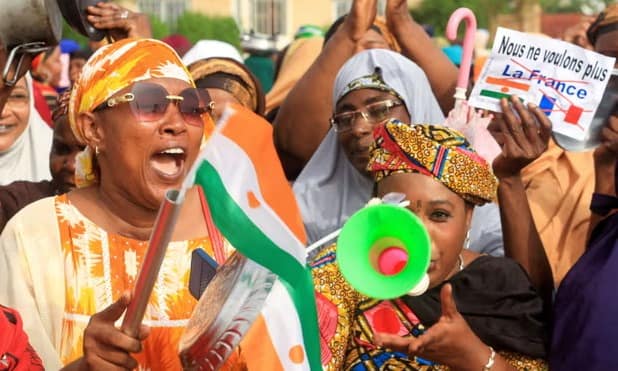Now warning lights are flashing red in Niger too, once considered one of the most stable states in the Sahel.
During the month after Niger’s military seized power, extremist-linked violence increased by more than 40%, according to the Armed Conflict Location & Event Data Project. At least 29 Nigerien soldiers were killed by jihadists on the border with Mali last weekend by more than 100 extremists using homemade explosives. It was the second such attack in a week.
France had approximately 1,500 troops based in Niger, which had become a central hub for the its counterinsurgency campaign across the Sahel. These provided potent capabilities in terms of firepower and training, but also communications and intelligence gathering. This makes it harder to replace this presence.
However, Italian and German troops remain in Niger and the senior soldiers now in power in Niamey, the capital, have not asked for the 1,000 US troops based there to leave, nor for evacuation of its hugely expensive drone base in Agadez.
Analysts say the US, which is reluctant to leave Niger open to Russian influence, has played a better diplomatic game, building more durable relationships with key Nigerien generals and negotiating with the military regime without labelling the takeover a coup d’état. France’s refusal to recognise Niger’s new rulers and support for the democratically elected president – however principled – has added insult to injury.
“It may not be a very good idea to kick [the French] out in such a manner but if is perfectly understandable that the regime felt that nothing would change in their relationship with Paris unless they took such a step,” said Olayinka Ajala, an expert on West Africa and the Sahel at Leeds Beckett University.
Across Africa, France is now reaping the consequences of decades of self-interested interference and commercial greed in their former colonies at a moment of widespread and vocal resentment of the western nations that exploited the continent for so long.
The wave of anger is being exacerbated by Russian propaganda, and is a potent tool in the hands of the new military regimes who are seeking to legitimise their grip on power after ousting elected governments, say analysts.
“This allows them to get badly needed popular support,” said Ajala.
Paris remains unrepentant. “All this will end very badly for the juntas in question,” Sébastien Lecornu, the French armed forces minister said last week. “It is their failure.”
